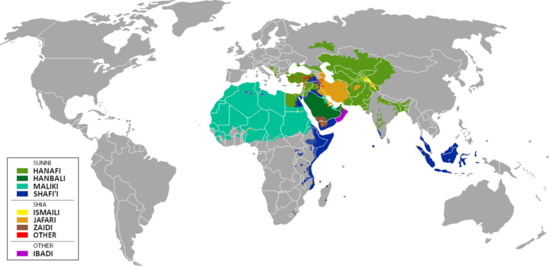There is no deen anywhere untouched by culture. Culture and religion share space and are deeply intertwined; sometimes dyadic, sometimes so complex it becomes a single irreducible unit. The purpose of a comparison is only to better facilitate how they interact with each other, but not to suggest a pure dichotomy between the two. Where there is religion there will always be culture—It can be debated if the reverse is true.Estranged wrote:You're conflating deen and culture. Culture is from the people and will be different between Muslims of varying backgrounds. There is nothing wrong with this as long as it doesn't go against any aspect of the deen. Deen is from Allah (Swt) and applies to every Muslim in every land, it is not subject to our preferences.TheMightyNomad wrote:First of all there is no such thing as pure deen. The message of Islam is for all people and all times; that’s the essence of its universality. So being a Muslim does not mean speaking Arabic or loosing one’s mother tongue and Muslims have no insight as to who will gain God’s favor on the Day of Judgment. The day and what will transpire therein are exclusive to God, not the creations. Islam does not require cultural uniformity. These are deeply embedded ideals of Islam in its altruistic universal application among people of diversity—from Sudan to Indonesia and any other geographical community where the faith is being practiced a semblance of peculiar culture could be seen. The same thing with us, the unique Somali expression within this faith is not homologous but in Somalia , the Somali traditions are distinctively Somali.
The primary challenge with Islam has always been that of the fact that those who God in His infinite wisdom has given the power to spread Islam are also doing so to spread their particular culture which is wrapped up in the Islamic ideology, as in the case of Saudi Arabia's Salafism, which is just Arab nationalism disguised as Islam. Is their brand of islam not ours.
This is the first, and still perhaps definitive “problem” which has created misunderstanding and misrepresentation and fueling the phobia shown or being shown to Islam in recent memory.
All those Somalis who are acting like bunch of pathetic victims yelling Arab supremacy, should take a page from the book of other Muslim communities in how they have successfully resisted Salafism or Najdi Arab Islam. Looking at Islam in Turkey, West Africa, Indonesia and China we see a strong de-emphasis on this Arabized Islamic version. This is testimony to the agency at work within these places.
There are, of course, differences of opinions on many matters within the deen; this is perfectly acceptable and has always existed. Then there are acts which have no basis in the deen; these are innovations which we have been warned about and must therefore reject.
What transpired in that video falls into the latter category.
All you are doing here is branding Saudi Arab islam as pure islam and make false distinction by branding every other form Islam as cultural ''innovation''. So you see this Salafists imposed mono-cultural Islam which tries to destroy culture and religious diversity within Islam. And while Salafism tries to make obsolete, it is the Arabized culture which they bring as the norm for diverse people. So race is irrelevant as long as Islam is Arabized. Something is not shirk just because Arabs do not practice it, it is if it goes against the basic tenants of islam.
Islam encourages culture and as part of the sources of Islamic law (Shari’a) there exist what is termed Urf (that’s the custom of a particular community of believers wherever they may be geographically located is accepted as part of Islamic practice; Islam has not said abandon that culture in so far as it is not contradictory to the basic tenets).
This is why Islam today remains one of the most culturally, colorful religion on the planet. We can look at the Harar and Somalia, and contrasts it with the Islam of southern Ethiopia of the Hamer, versus the dynamic aesthetic of Islam in Senegal and Mali. Islam has always been a photogenic religion because of the expression of cultures in it. The saying goes that ‘Islam is like water passing over a rock; it takes the color of the stone it passes over.’
Islam in its set of regulations does not inform aesthetic but rules and regulations and codes of conduct. Styles may differ but the central concept is what matters.






